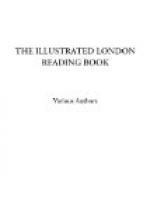of, was perfectly understood and practised by the
ancients—that the Muses of the Greeks always
sung, and their song was the echo of the subject,
which swelled their poetry into enthusiasm and rapture.
An inquiry into the nature and merits of the ancient
music, and a comparison thereof with modern composition,
by a person of poetic genius and an admirer of harmony,
who is free from the shackles of practice, and the
prejudices of the mode, aided by the countenance of
a few men of rank, of elevated and true taste, would
probably lay the present half-Gothic mode of music
in ruins, like those towers of whose little laboured
ornaments it is an exact picture, and restore the
Grecian taste of passionate harmony once more to the
delight and wonder of mankind. But as from the
disposition of things, and the force of fashion, we
cannot hope in our time to rescue the sacred lyre,
and see it put into the hands of men of genius, I can
only recall you to your own natural feeling of harmony
and observe to you, that its emotions are not found
in the laboured, fantastic, and surprising compositions
that form the modern style of music: but you meet
them in some few pieces that are the growth of wild
unvitiated taste; you discover them in the swelling
sounds that wrap us in imaginary grandeur; in those
plaintive notes that make us in love with woe; in the
tones that utter the lover’s sighs, and fluctuate
the breast with gentle pain; in the noble strokes
that coil up the courage and fury of the soul, or
that lull it in confused visions of joy; in short,
in those affecting strains that find their way to
the inmost recesses of the heart,
Untwisting all the chains
that tie
The hidden soul of harmony.—Milton.
USHER.
* * * *
*
THE AFFLICTED POOR.
Say ye—oppress’d
by some fantastic woes,
Some jarring nerve that baffles
your repose,
Who press the downy couch
while slaves advance
With timid eye to read the
distant glance;
Who with sad pray’rs
the weary doctor tease,
To name the nameless, ever
new disease;
Who with mock patience dire
complaint endure,
Which real pain, and that
alone, can cure:
How would ye bear in real
pain to lie,
Despised, neglected, left
alone to die?
How would ye bear to draw
your latest breath,
Where all that’s wretched
paves the way for death?
Such is that room which one
rude beam divides,
And naked rafters form the
sloping sides;
Where the vile bands that
bind the thatch are seen,
And lath and mud are all that
lie between,
Save one dull pane that coarsely
patch’d gives way
To the rude tempest, yet excludes
the day:
There, on a matted flock with
dust o’erspread,
The drooping wretch reclines
his languid head!
For him no hand the cordial
cup supplies,
Nor wipes the tear which stagnates
in his eyes;
No friends, with soft discourse,
his pangs beguile.
Nor promise hope till sickness
wears a smile.




